Analyzing Carbon Emission Effects on Logistics Service in Nigeria
VerifiedAdded on 2022/09/01
|9
|2187
|17
Report
AI Summary
This report investigates the impact of carbon emissions on climate change and its effects on logistics service providers in Nigeria. It reviews existing literature on the influence of carbon emissions and greenhouse gases on changing weather conditions, highlighting challenges faced by Nigerian logistics companies due to climate events like floods and droughts. The research employs a deductive approach, utilizing quantitative data analysis techniques such as correlation analysis with SPSS software. The expected findings suggest that carbon emissions alter Nigeria's climate, negatively impacting the transportation and distribution of goods, ultimately affecting customer loyalty. The report also acknowledges potential problems encountered during data collection and analysis.
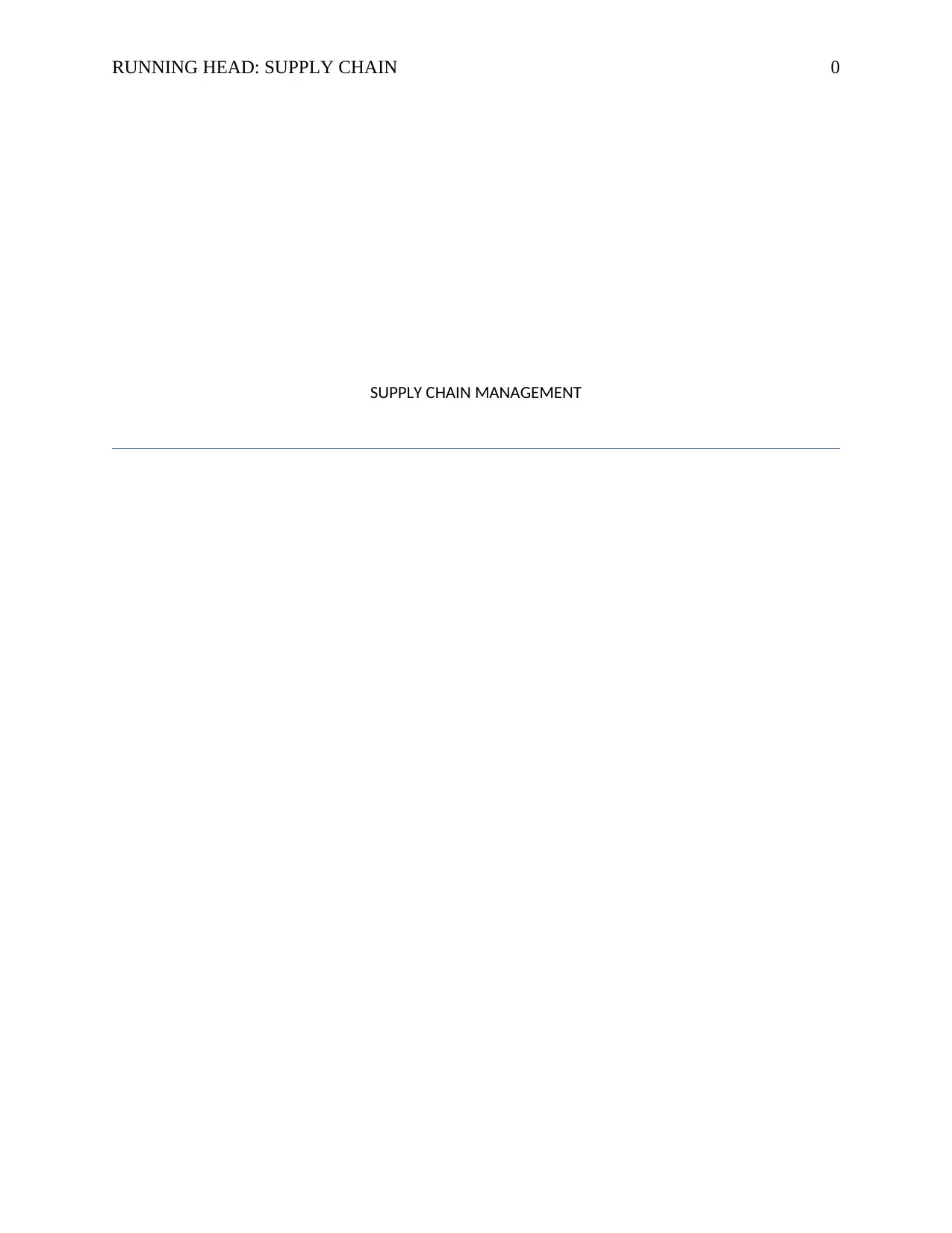
RUNNING HEAD: SUPPLY CHAIN 0
SUPPLY CHAIN MANAGEMENT
SUPPLY CHAIN MANAGEMENT
Paraphrase This Document
Need a fresh take? Get an instant paraphrase of this document with our AI Paraphraser
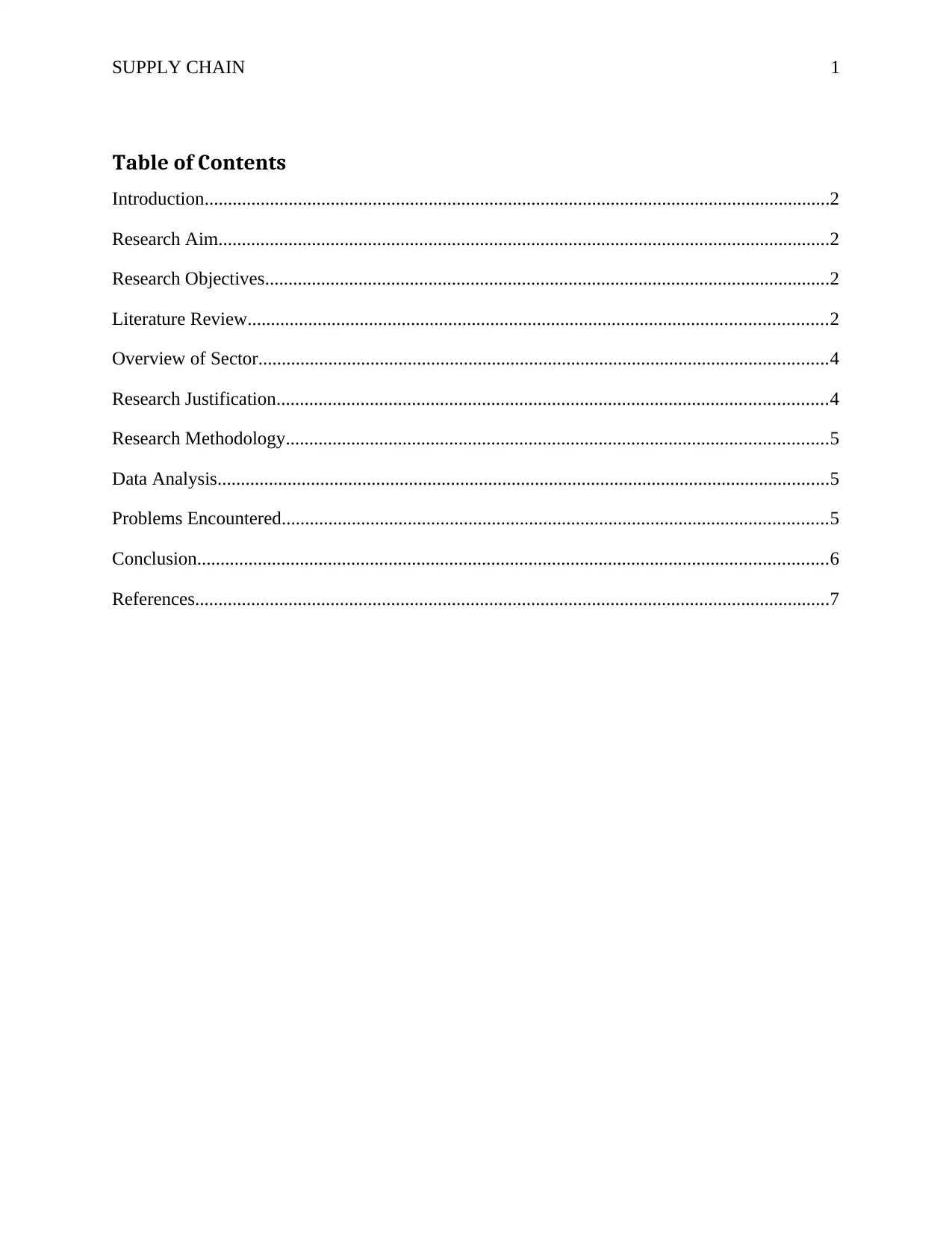
SUPPLY CHAIN 1
Table of Contents
Introduction......................................................................................................................................2
Research Aim...................................................................................................................................2
Research Objectives.........................................................................................................................2
Literature Review............................................................................................................................2
Overview of Sector..........................................................................................................................4
Research Justification......................................................................................................................4
Research Methodology....................................................................................................................5
Data Analysis...................................................................................................................................5
Problems Encountered.....................................................................................................................5
Conclusion.......................................................................................................................................6
References........................................................................................................................................7
Table of Contents
Introduction......................................................................................................................................2
Research Aim...................................................................................................................................2
Research Objectives.........................................................................................................................2
Literature Review............................................................................................................................2
Overview of Sector..........................................................................................................................4
Research Justification......................................................................................................................4
Research Methodology....................................................................................................................5
Data Analysis...................................................................................................................................5
Problems Encountered.....................................................................................................................5
Conclusion.......................................................................................................................................6
References........................................................................................................................................7
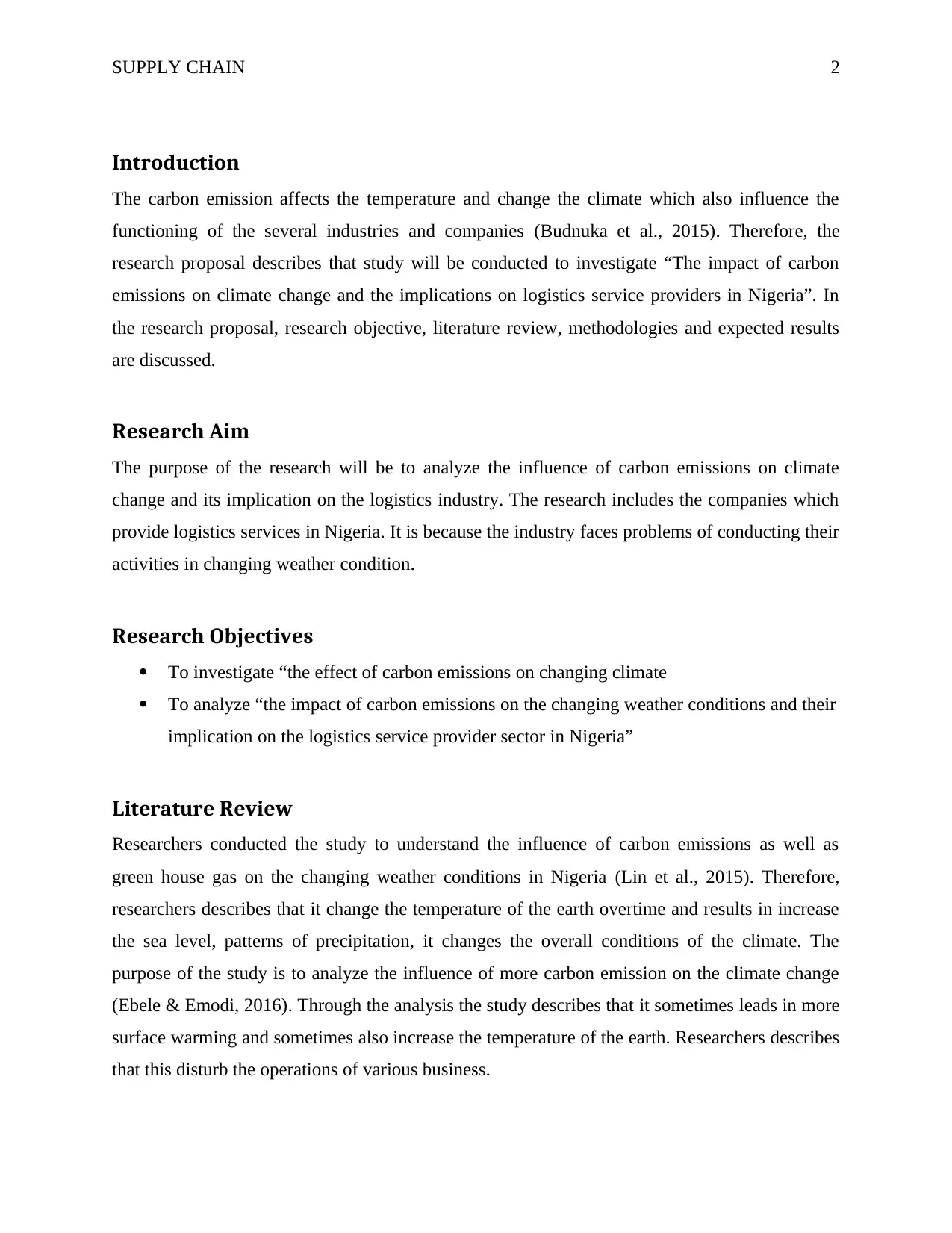
SUPPLY CHAIN 2
Introduction
The carbon emission affects the temperature and change the climate which also influence the
functioning of the several industries and companies (Budnuka et al., 2015). Therefore, the
research proposal describes that study will be conducted to investigate “The impact of carbon
emissions on climate change and the implications on logistics service providers in Nigeria”. In
the research proposal, research objective, literature review, methodologies and expected results
are discussed.
Research Aim
The purpose of the research will be to analyze the influence of carbon emissions on climate
change and its implication on the logistics industry. The research includes the companies which
provide logistics services in Nigeria. It is because the industry faces problems of conducting their
activities in changing weather condition.
Research Objectives
To investigate “the effect of carbon emissions on changing climate
To analyze “the impact of carbon emissions on the changing weather conditions and their
implication on the logistics service provider sector in Nigeria”
Literature Review
Researchers conducted the study to understand the influence of carbon emissions as well as
green house gas on the changing weather conditions in Nigeria (Lin et al., 2015). Therefore,
researchers describes that it change the temperature of the earth overtime and results in increase
the sea level, patterns of precipitation, it changes the overall conditions of the climate. The
purpose of the study is to analyze the influence of more carbon emission on the climate change
(Ebele & Emodi, 2016). Through the analysis the study describes that it sometimes leads in more
surface warming and sometimes also increase the temperature of the earth. Researchers describes
that this disturb the operations of various business.
Introduction
The carbon emission affects the temperature and change the climate which also influence the
functioning of the several industries and companies (Budnuka et al., 2015). Therefore, the
research proposal describes that study will be conducted to investigate “The impact of carbon
emissions on climate change and the implications on logistics service providers in Nigeria”. In
the research proposal, research objective, literature review, methodologies and expected results
are discussed.
Research Aim
The purpose of the research will be to analyze the influence of carbon emissions on climate
change and its implication on the logistics industry. The research includes the companies which
provide logistics services in Nigeria. It is because the industry faces problems of conducting their
activities in changing weather condition.
Research Objectives
To investigate “the effect of carbon emissions on changing climate
To analyze “the impact of carbon emissions on the changing weather conditions and their
implication on the logistics service provider sector in Nigeria”
Literature Review
Researchers conducted the study to understand the influence of carbon emissions as well as
green house gas on the changing weather conditions in Nigeria (Lin et al., 2015). Therefore,
researchers describes that it change the temperature of the earth overtime and results in increase
the sea level, patterns of precipitation, it changes the overall conditions of the climate. The
purpose of the study is to analyze the influence of more carbon emission on the climate change
(Ebele & Emodi, 2016). Through the analysis the study describes that it sometimes leads in more
surface warming and sometimes also increase the temperature of the earth. Researchers describes
that this disturb the operations of various business.
⊘ This is a preview!⊘
Do you want full access?
Subscribe today to unlock all pages.

Trusted by 1+ million students worldwide
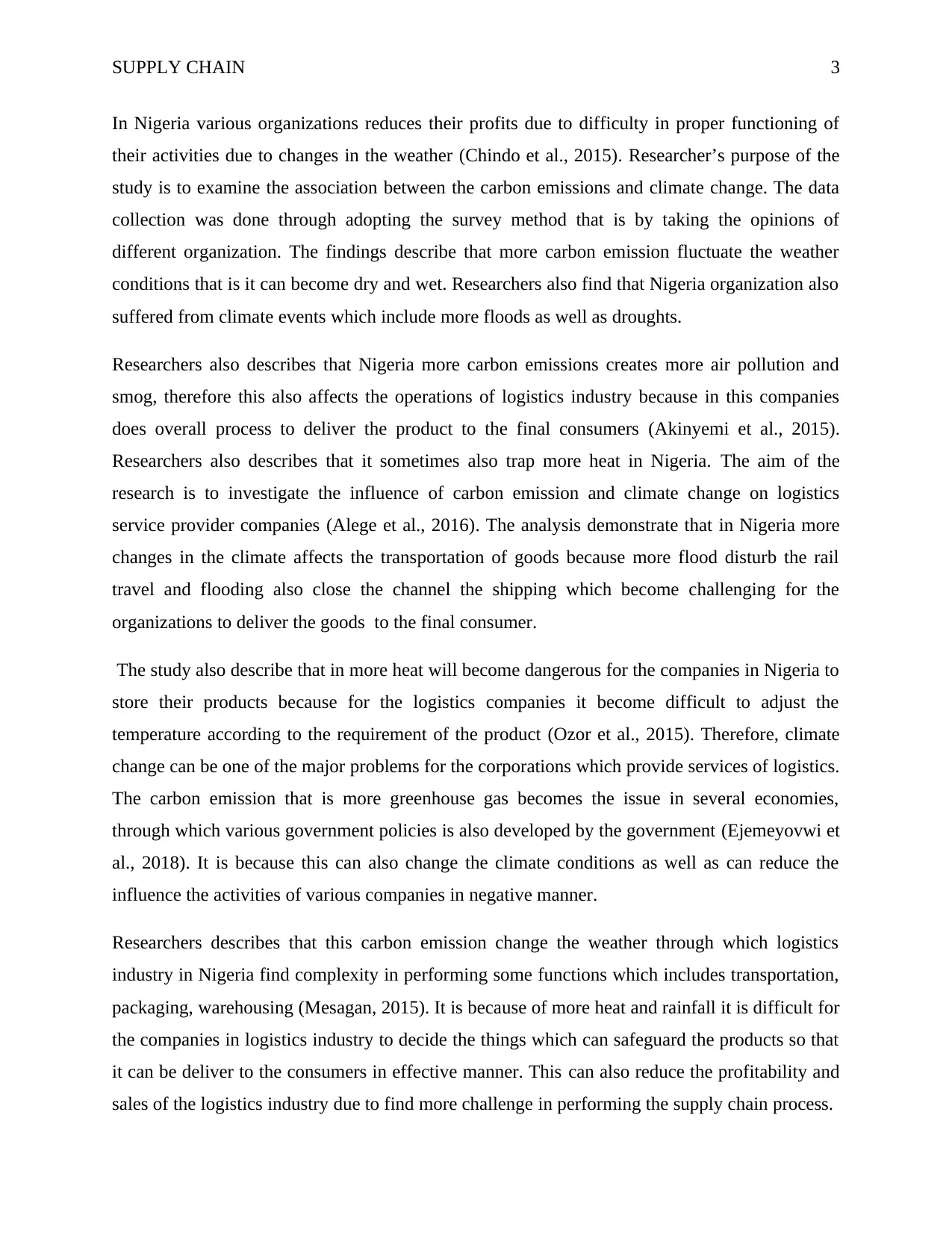
SUPPLY CHAIN 3
In Nigeria various organizations reduces their profits due to difficulty in proper functioning of
their activities due to changes in the weather (Chindo et al., 2015). Researcher’s purpose of the
study is to examine the association between the carbon emissions and climate change. The data
collection was done through adopting the survey method that is by taking the opinions of
different organization. The findings describe that more carbon emission fluctuate the weather
conditions that is it can become dry and wet. Researchers also find that Nigeria organization also
suffered from climate events which include more floods as well as droughts.
Researchers also describes that Nigeria more carbon emissions creates more air pollution and
smog, therefore this also affects the operations of logistics industry because in this companies
does overall process to deliver the product to the final consumers (Akinyemi et al., 2015).
Researchers also describes that it sometimes also trap more heat in Nigeria. The aim of the
research is to investigate the influence of carbon emission and climate change on logistics
service provider companies (Alege et al., 2016). The analysis demonstrate that in Nigeria more
changes in the climate affects the transportation of goods because more flood disturb the rail
travel and flooding also close the channel the shipping which become challenging for the
organizations to deliver the goods to the final consumer.
The study also describe that in more heat will become dangerous for the companies in Nigeria to
store their products because for the logistics companies it become difficult to adjust the
temperature according to the requirement of the product (Ozor et al., 2015). Therefore, climate
change can be one of the major problems for the corporations which provide services of logistics.
The carbon emission that is more greenhouse gas becomes the issue in several economies,
through which various government policies is also developed by the government (Ejemeyovwi et
al., 2018). It is because this can also change the climate conditions as well as can reduce the
influence the activities of various companies in negative manner.
Researchers describes that this carbon emission change the weather through which logistics
industry in Nigeria find complexity in performing some functions which includes transportation,
packaging, warehousing (Mesagan, 2015). It is because of more heat and rainfall it is difficult for
the companies in logistics industry to decide the things which can safeguard the products so that
it can be deliver to the consumers in effective manner. This can also reduce the profitability and
sales of the logistics industry due to find more challenge in performing the supply chain process.
In Nigeria various organizations reduces their profits due to difficulty in proper functioning of
their activities due to changes in the weather (Chindo et al., 2015). Researcher’s purpose of the
study is to examine the association between the carbon emissions and climate change. The data
collection was done through adopting the survey method that is by taking the opinions of
different organization. The findings describe that more carbon emission fluctuate the weather
conditions that is it can become dry and wet. Researchers also find that Nigeria organization also
suffered from climate events which include more floods as well as droughts.
Researchers also describes that Nigeria more carbon emissions creates more air pollution and
smog, therefore this also affects the operations of logistics industry because in this companies
does overall process to deliver the product to the final consumers (Akinyemi et al., 2015).
Researchers also describes that it sometimes also trap more heat in Nigeria. The aim of the
research is to investigate the influence of carbon emission and climate change on logistics
service provider companies (Alege et al., 2016). The analysis demonstrate that in Nigeria more
changes in the climate affects the transportation of goods because more flood disturb the rail
travel and flooding also close the channel the shipping which become challenging for the
organizations to deliver the goods to the final consumer.
The study also describe that in more heat will become dangerous for the companies in Nigeria to
store their products because for the logistics companies it become difficult to adjust the
temperature according to the requirement of the product (Ozor et al., 2015). Therefore, climate
change can be one of the major problems for the corporations which provide services of logistics.
The carbon emission that is more greenhouse gas becomes the issue in several economies,
through which various government policies is also developed by the government (Ejemeyovwi et
al., 2018). It is because this can also change the climate conditions as well as can reduce the
influence the activities of various companies in negative manner.
Researchers describes that this carbon emission change the weather through which logistics
industry in Nigeria find complexity in performing some functions which includes transportation,
packaging, warehousing (Mesagan, 2015). It is because of more heat and rainfall it is difficult for
the companies in logistics industry to decide the things which can safeguard the products so that
it can be deliver to the consumers in effective manner. This can also reduce the profitability and
sales of the logistics industry due to find more challenge in performing the supply chain process.
Paraphrase This Document
Need a fresh take? Get an instant paraphrase of this document with our AI Paraphraser
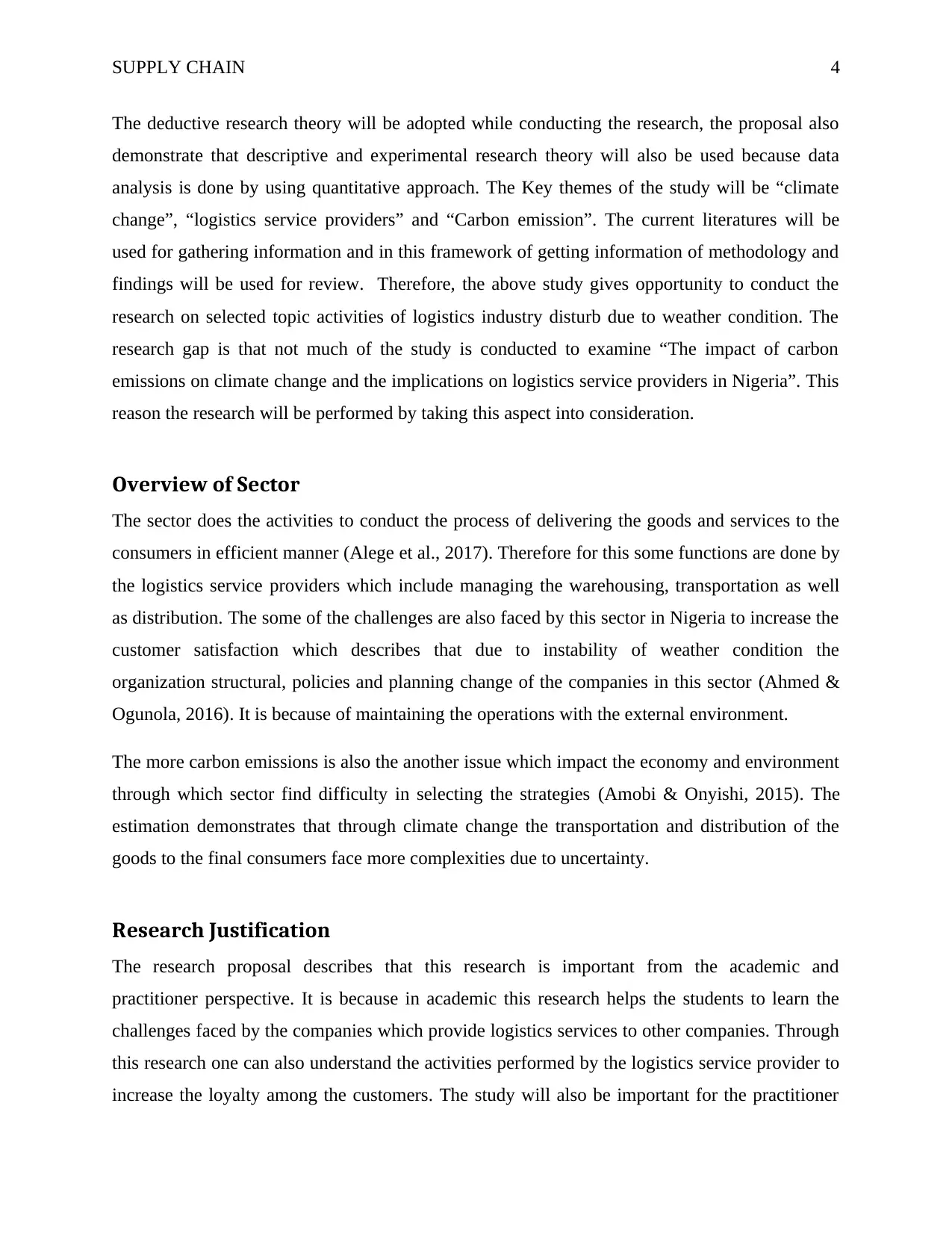
SUPPLY CHAIN 4
The deductive research theory will be adopted while conducting the research, the proposal also
demonstrate that descriptive and experimental research theory will also be used because data
analysis is done by using quantitative approach. The Key themes of the study will be “climate
change”, “logistics service providers” and “Carbon emission”. The current literatures will be
used for gathering information and in this framework of getting information of methodology and
findings will be used for review. Therefore, the above study gives opportunity to conduct the
research on selected topic activities of logistics industry disturb due to weather condition. The
research gap is that not much of the study is conducted to examine “The impact of carbon
emissions on climate change and the implications on logistics service providers in Nigeria”. This
reason the research will be performed by taking this aspect into consideration.
Overview of Sector
The sector does the activities to conduct the process of delivering the goods and services to the
consumers in efficient manner (Alege et al., 2017). Therefore for this some functions are done by
the logistics service providers which include managing the warehousing, transportation as well
as distribution. The some of the challenges are also faced by this sector in Nigeria to increase the
customer satisfaction which describes that due to instability of weather condition the
organization structural, policies and planning change of the companies in this sector (Ahmed &
Ogunola, 2016). It is because of maintaining the operations with the external environment.
The more carbon emissions is also the another issue which impact the economy and environment
through which sector find difficulty in selecting the strategies (Amobi & Onyishi, 2015). The
estimation demonstrates that through climate change the transportation and distribution of the
goods to the final consumers face more complexities due to uncertainty.
Research Justification
The research proposal describes that this research is important from the academic and
practitioner perspective. It is because in academic this research helps the students to learn the
challenges faced by the companies which provide logistics services to other companies. Through
this research one can also understand the activities performed by the logistics service provider to
increase the loyalty among the customers. The study will also be important for the practitioner
The deductive research theory will be adopted while conducting the research, the proposal also
demonstrate that descriptive and experimental research theory will also be used because data
analysis is done by using quantitative approach. The Key themes of the study will be “climate
change”, “logistics service providers” and “Carbon emission”. The current literatures will be
used for gathering information and in this framework of getting information of methodology and
findings will be used for review. Therefore, the above study gives opportunity to conduct the
research on selected topic activities of logistics industry disturb due to weather condition. The
research gap is that not much of the study is conducted to examine “The impact of carbon
emissions on climate change and the implications on logistics service providers in Nigeria”. This
reason the research will be performed by taking this aspect into consideration.
Overview of Sector
The sector does the activities to conduct the process of delivering the goods and services to the
consumers in efficient manner (Alege et al., 2017). Therefore for this some functions are done by
the logistics service providers which include managing the warehousing, transportation as well
as distribution. The some of the challenges are also faced by this sector in Nigeria to increase the
customer satisfaction which describes that due to instability of weather condition the
organization structural, policies and planning change of the companies in this sector (Ahmed &
Ogunola, 2016). It is because of maintaining the operations with the external environment.
The more carbon emissions is also the another issue which impact the economy and environment
through which sector find difficulty in selecting the strategies (Amobi & Onyishi, 2015). The
estimation demonstrates that through climate change the transportation and distribution of the
goods to the final consumers face more complexities due to uncertainty.
Research Justification
The research proposal describes that this research is important from the academic and
practitioner perspective. It is because in academic this research helps the students to learn the
challenges faced by the companies which provide logistics services to other companies. Through
this research one can also understand the activities performed by the logistics service provider to
increase the loyalty among the customers. The study will also be important for the practitioner
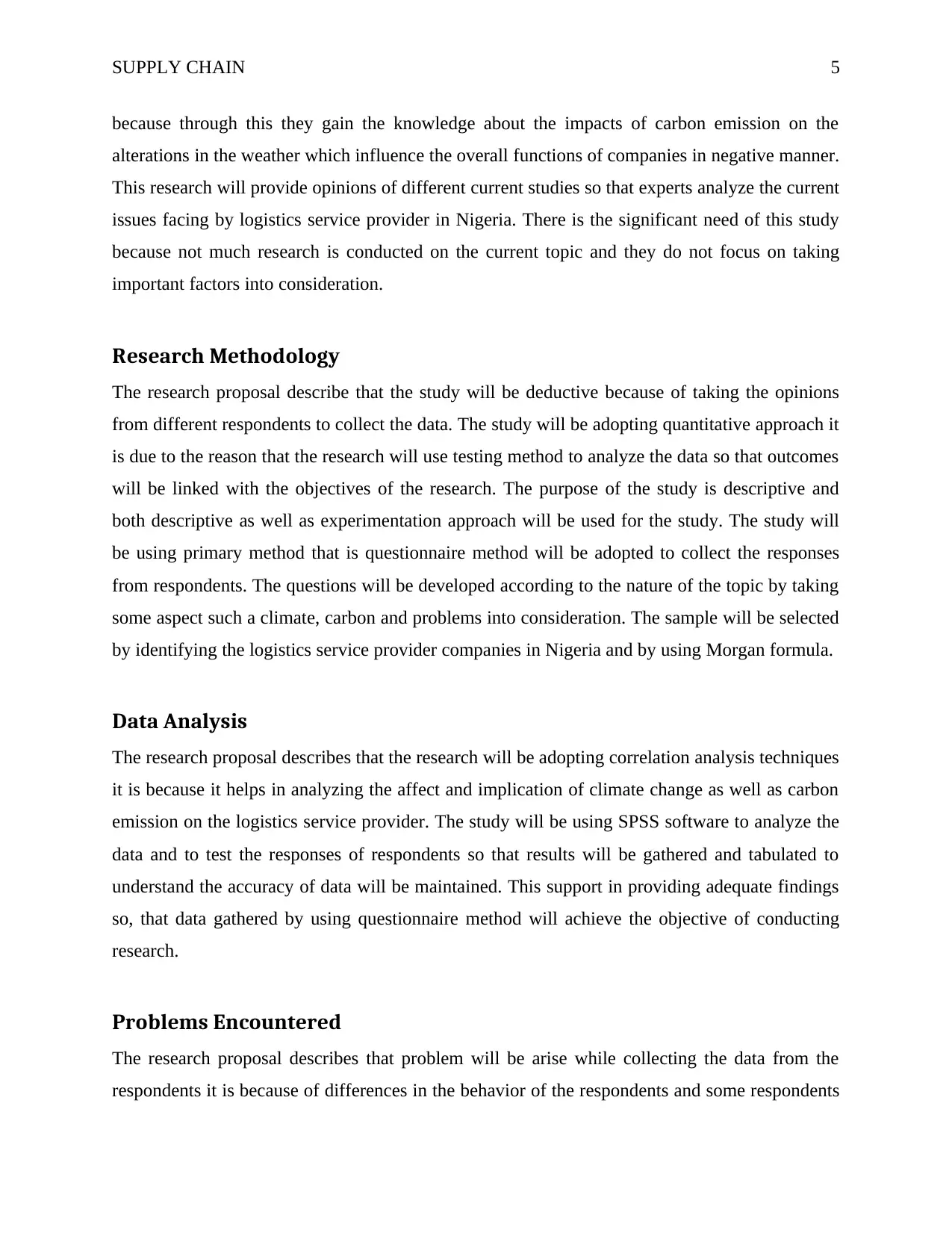
SUPPLY CHAIN 5
because through this they gain the knowledge about the impacts of carbon emission on the
alterations in the weather which influence the overall functions of companies in negative manner.
This research will provide opinions of different current studies so that experts analyze the current
issues facing by logistics service provider in Nigeria. There is the significant need of this study
because not much research is conducted on the current topic and they do not focus on taking
important factors into consideration.
Research Methodology
The research proposal describe that the study will be deductive because of taking the opinions
from different respondents to collect the data. The study will be adopting quantitative approach it
is due to the reason that the research will use testing method to analyze the data so that outcomes
will be linked with the objectives of the research. The purpose of the study is descriptive and
both descriptive as well as experimentation approach will be used for the study. The study will
be using primary method that is questionnaire method will be adopted to collect the responses
from respondents. The questions will be developed according to the nature of the topic by taking
some aspect such a climate, carbon and problems into consideration. The sample will be selected
by identifying the logistics service provider companies in Nigeria and by using Morgan formula.
Data Analysis
The research proposal describes that the research will be adopting correlation analysis techniques
it is because it helps in analyzing the affect and implication of climate change as well as carbon
emission on the logistics service provider. The study will be using SPSS software to analyze the
data and to test the responses of respondents so that results will be gathered and tabulated to
understand the accuracy of data will be maintained. This support in providing adequate findings
so, that data gathered by using questionnaire method will achieve the objective of conducting
research.
Problems Encountered
The research proposal describes that problem will be arise while collecting the data from the
respondents it is because of differences in the behavior of the respondents and some respondents
because through this they gain the knowledge about the impacts of carbon emission on the
alterations in the weather which influence the overall functions of companies in negative manner.
This research will provide opinions of different current studies so that experts analyze the current
issues facing by logistics service provider in Nigeria. There is the significant need of this study
because not much research is conducted on the current topic and they do not focus on taking
important factors into consideration.
Research Methodology
The research proposal describe that the study will be deductive because of taking the opinions
from different respondents to collect the data. The study will be adopting quantitative approach it
is due to the reason that the research will use testing method to analyze the data so that outcomes
will be linked with the objectives of the research. The purpose of the study is descriptive and
both descriptive as well as experimentation approach will be used for the study. The study will
be using primary method that is questionnaire method will be adopted to collect the responses
from respondents. The questions will be developed according to the nature of the topic by taking
some aspect such a climate, carbon and problems into consideration. The sample will be selected
by identifying the logistics service provider companies in Nigeria and by using Morgan formula.
Data Analysis
The research proposal describes that the research will be adopting correlation analysis techniques
it is because it helps in analyzing the affect and implication of climate change as well as carbon
emission on the logistics service provider. The study will be using SPSS software to analyze the
data and to test the responses of respondents so that results will be gathered and tabulated to
understand the accuracy of data will be maintained. This support in providing adequate findings
so, that data gathered by using questionnaire method will achieve the objective of conducting
research.
Problems Encountered
The research proposal describes that problem will be arise while collecting the data from the
respondents it is because of differences in the behavior of the respondents and some respondents
⊘ This is a preview!⊘
Do you want full access?
Subscribe today to unlock all pages.

Trusted by 1+ million students worldwide
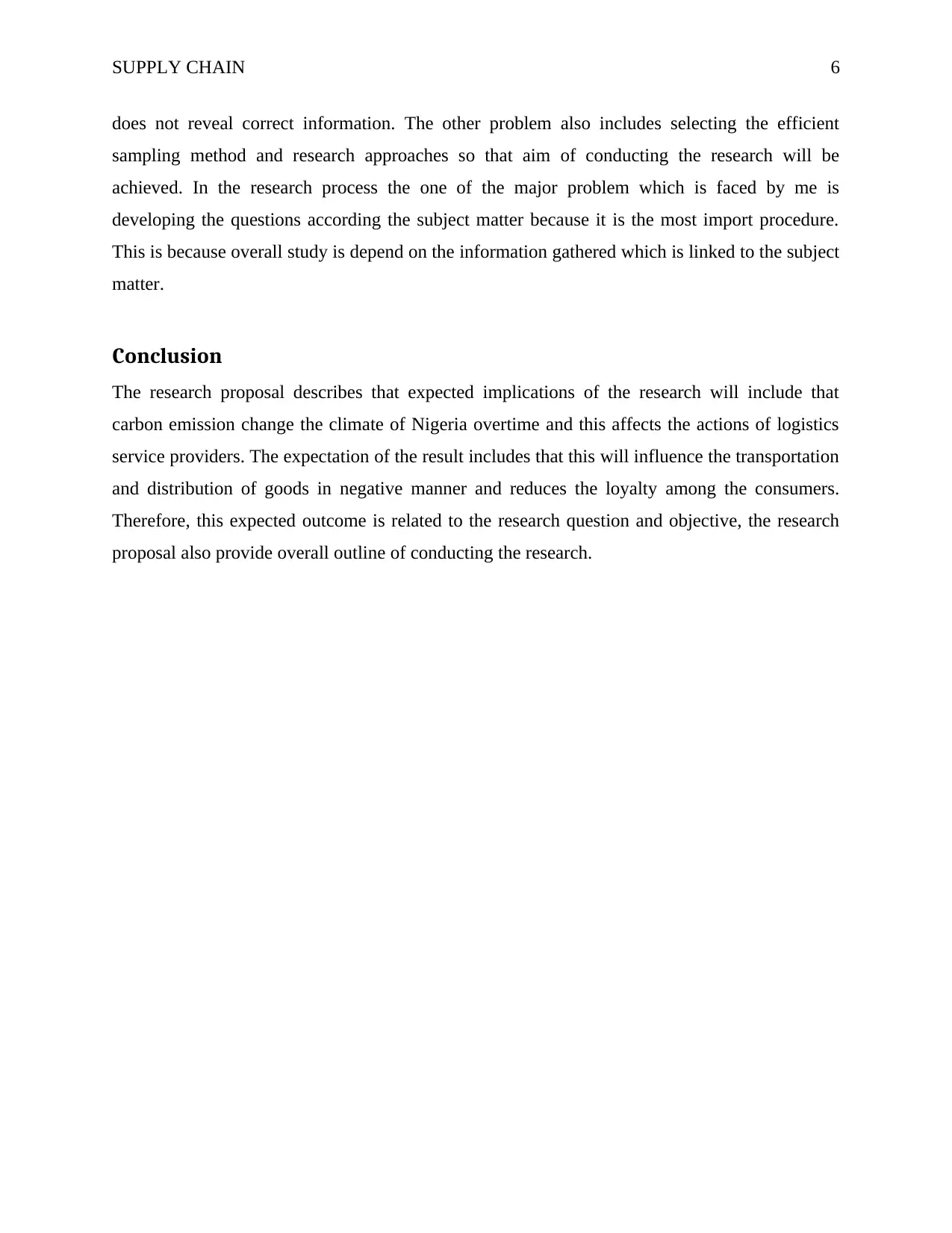
SUPPLY CHAIN 6
does not reveal correct information. The other problem also includes selecting the efficient
sampling method and research approaches so that aim of conducting the research will be
achieved. In the research process the one of the major problem which is faced by me is
developing the questions according the subject matter because it is the most import procedure.
This is because overall study is depend on the information gathered which is linked to the subject
matter.
Conclusion
The research proposal describes that expected implications of the research will include that
carbon emission change the climate of Nigeria overtime and this affects the actions of logistics
service providers. The expectation of the result includes that this will influence the transportation
and distribution of goods in negative manner and reduces the loyalty among the consumers.
Therefore, this expected outcome is related to the research question and objective, the research
proposal also provide overall outline of conducting the research.
does not reveal correct information. The other problem also includes selecting the efficient
sampling method and research approaches so that aim of conducting the research will be
achieved. In the research process the one of the major problem which is faced by me is
developing the questions according the subject matter because it is the most import procedure.
This is because overall study is depend on the information gathered which is linked to the subject
matter.
Conclusion
The research proposal describes that expected implications of the research will include that
carbon emission change the climate of Nigeria overtime and this affects the actions of logistics
service providers. The expectation of the result includes that this will influence the transportation
and distribution of goods in negative manner and reduces the loyalty among the consumers.
Therefore, this expected outcome is related to the research question and objective, the research
proposal also provide overall outline of conducting the research.
Paraphrase This Document
Need a fresh take? Get an instant paraphrase of this document with our AI Paraphraser
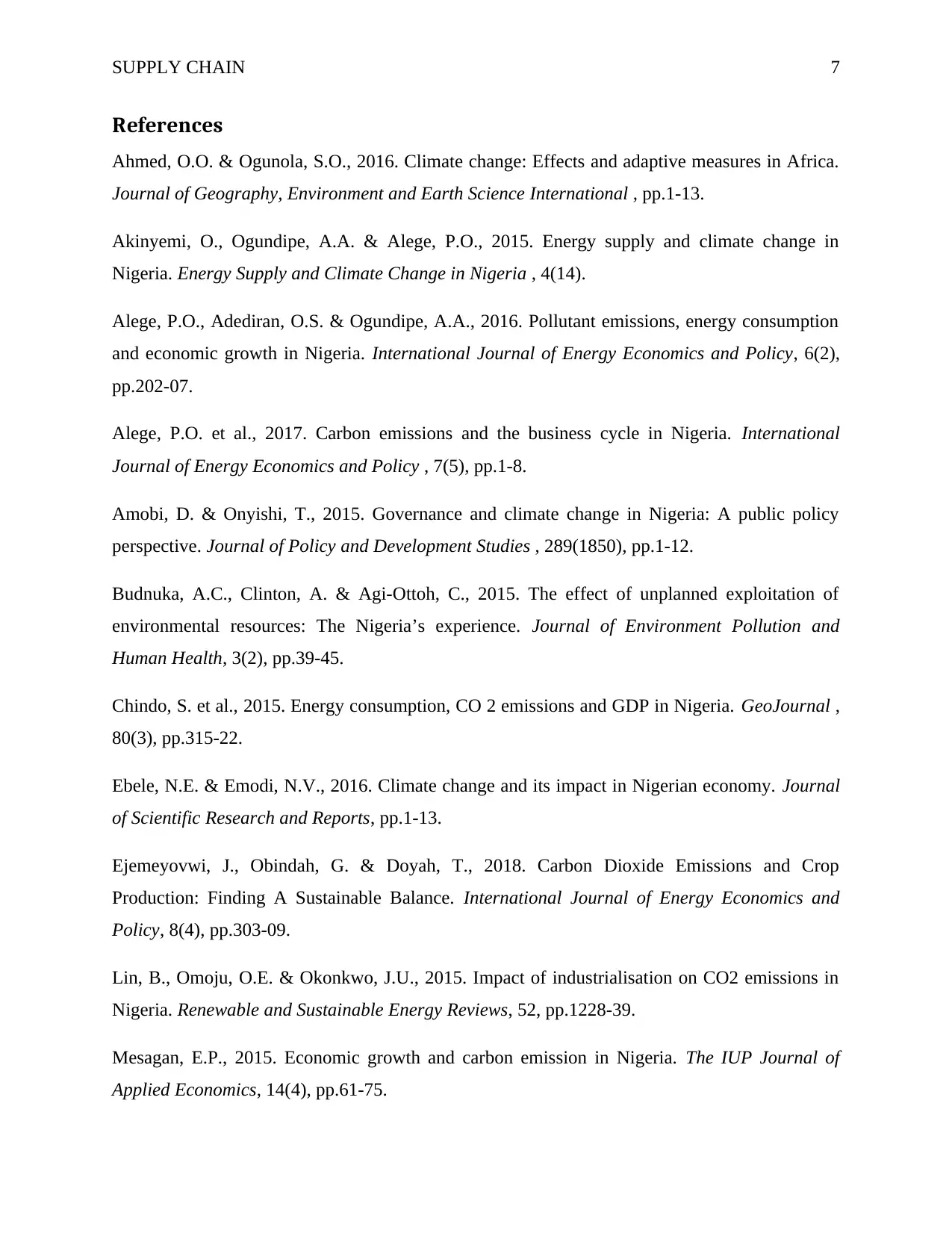
SUPPLY CHAIN 7
References
Ahmed, O.O. & Ogunola, S.O., 2016. Climate change: Effects and adaptive measures in Africa.
Journal of Geography, Environment and Earth Science International , pp.1-13.
Akinyemi, O., Ogundipe, A.A. & Alege, P.O., 2015. Energy supply and climate change in
Nigeria. Energy Supply and Climate Change in Nigeria , 4(14).
Alege, P.O., Adediran, O.S. & Ogundipe, A.A., 2016. Pollutant emissions, energy consumption
and economic growth in Nigeria. International Journal of Energy Economics and Policy, 6(2),
pp.202-07.
Alege, P.O. et al., 2017. Carbon emissions and the business cycle in Nigeria. International
Journal of Energy Economics and Policy , 7(5), pp.1-8.
Amobi, D. & Onyishi, T., 2015. Governance and climate change in Nigeria: A public policy
perspective. Journal of Policy and Development Studies , 289(1850), pp.1-12.
Budnuka, A.C., Clinton, A. & Agi-Ottoh, C., 2015. The effect of unplanned exploitation of
environmental resources: The Nigeria’s experience. Journal of Environment Pollution and
Human Health, 3(2), pp.39-45.
Chindo, S. et al., 2015. Energy consumption, CO 2 emissions and GDP in Nigeria. GeoJournal ,
80(3), pp.315-22.
Ebele, N.E. & Emodi, N.V., 2016. Climate change and its impact in Nigerian economy. Journal
of Scientific Research and Reports, pp.1-13.
Ejemeyovwi, J., Obindah, G. & Doyah, T., 2018. Carbon Dioxide Emissions and Crop
Production: Finding A Sustainable Balance. International Journal of Energy Economics and
Policy, 8(4), pp.303-09.
Lin, B., Omoju, O.E. & Okonkwo, J.U., 2015. Impact of industrialisation on CO2 emissions in
Nigeria. Renewable and Sustainable Energy Reviews, 52, pp.1228-39.
Mesagan, E.P., 2015. Economic growth and carbon emission in Nigeria. The IUP Journal of
Applied Economics, 14(4), pp.61-75.
References
Ahmed, O.O. & Ogunola, S.O., 2016. Climate change: Effects and adaptive measures in Africa.
Journal of Geography, Environment and Earth Science International , pp.1-13.
Akinyemi, O., Ogundipe, A.A. & Alege, P.O., 2015. Energy supply and climate change in
Nigeria. Energy Supply and Climate Change in Nigeria , 4(14).
Alege, P.O., Adediran, O.S. & Ogundipe, A.A., 2016. Pollutant emissions, energy consumption
and economic growth in Nigeria. International Journal of Energy Economics and Policy, 6(2),
pp.202-07.
Alege, P.O. et al., 2017. Carbon emissions and the business cycle in Nigeria. International
Journal of Energy Economics and Policy , 7(5), pp.1-8.
Amobi, D. & Onyishi, T., 2015. Governance and climate change in Nigeria: A public policy
perspective. Journal of Policy and Development Studies , 289(1850), pp.1-12.
Budnuka, A.C., Clinton, A. & Agi-Ottoh, C., 2015. The effect of unplanned exploitation of
environmental resources: The Nigeria’s experience. Journal of Environment Pollution and
Human Health, 3(2), pp.39-45.
Chindo, S. et al., 2015. Energy consumption, CO 2 emissions and GDP in Nigeria. GeoJournal ,
80(3), pp.315-22.
Ebele, N.E. & Emodi, N.V., 2016. Climate change and its impact in Nigerian economy. Journal
of Scientific Research and Reports, pp.1-13.
Ejemeyovwi, J., Obindah, G. & Doyah, T., 2018. Carbon Dioxide Emissions and Crop
Production: Finding A Sustainable Balance. International Journal of Energy Economics and
Policy, 8(4), pp.303-09.
Lin, B., Omoju, O.E. & Okonkwo, J.U., 2015. Impact of industrialisation on CO2 emissions in
Nigeria. Renewable and Sustainable Energy Reviews, 52, pp.1228-39.
Mesagan, E.P., 2015. Economic growth and carbon emission in Nigeria. The IUP Journal of
Applied Economics, 14(4), pp.61-75.

SUPPLY CHAIN 8
Ozor, N., Umunakwe, P.C., Ani, A.O. & Nnadi, F.N., 2015. Perceived impacts of climate change
among rural farmers in Imo State, Nigeria. African Journal of Agricultural Research, 10(14),
pp.1756-64.
Ozor, N., Umunakwe, P.C., Ani, A.O. & Nnadi, F.N., 2015. Perceived impacts of climate change
among rural farmers in Imo State, Nigeria. African Journal of Agricultural Research, 10(14),
pp.1756-64.
⊘ This is a preview!⊘
Do you want full access?
Subscribe today to unlock all pages.

Trusted by 1+ million students worldwide
1 out of 9
Related Documents
Your All-in-One AI-Powered Toolkit for Academic Success.
+13062052269
info@desklib.com
Available 24*7 on WhatsApp / Email
![[object Object]](/_next/static/media/star-bottom.7253800d.svg)
Unlock your academic potential
Copyright © 2020–2026 A2Z Services. All Rights Reserved. Developed and managed by ZUCOL.



